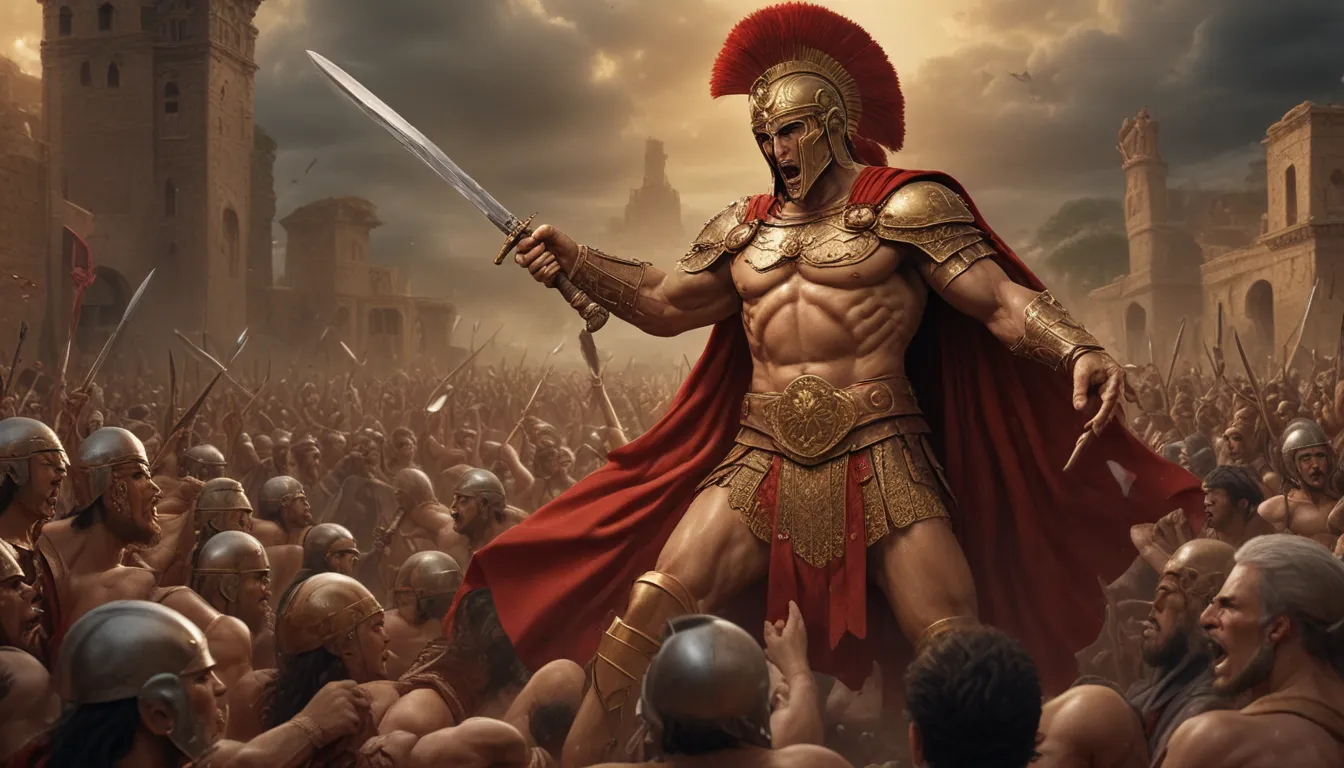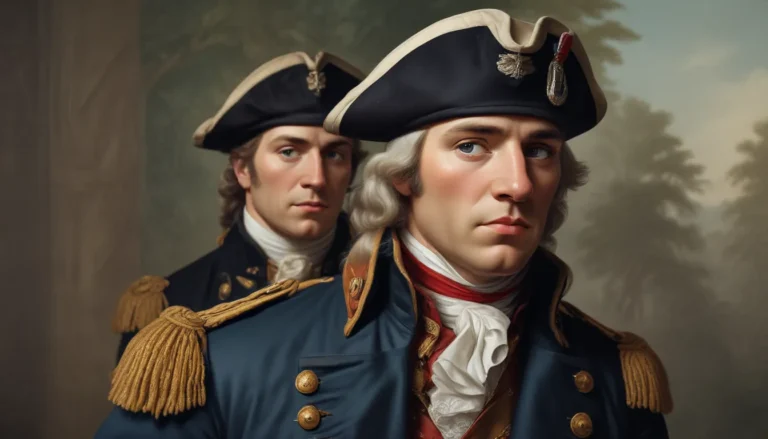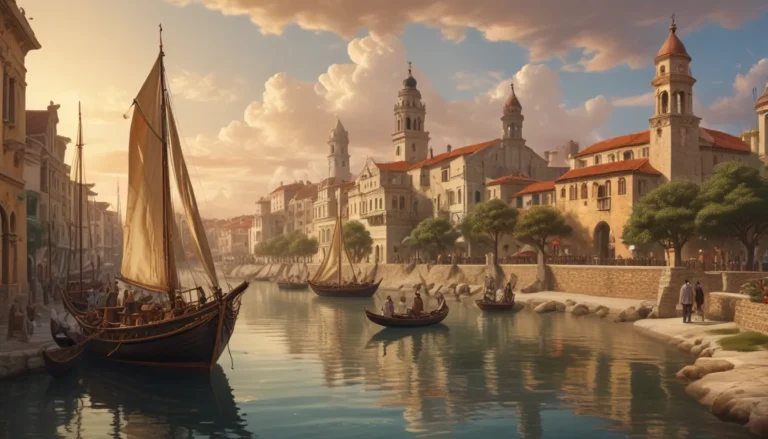The images in our articles may not match the content exactly. They are used to grab your attention, not to show the exact details in the text. The images complement the text but do not replace it.
Have you ever been captivated by the timeless tales of ancient history that have shaped our understanding of the past? If so, get ready for a fascinating journey into one of the most legendary conflicts of all time: The Trojan War. This epic saga, infused with heroes, gods, and a cunning wooden horse, blurs the lines between myth and history, making it a captivating topic to explore. From the valiant Achilles to the cunning Odysseus and the iconic Helen of Troy, whose beauty “launched a thousand ships,” the Trojan War is a tale filled with intrigue, bravery, and strategic warfare. So, buckle up as we delve into some of the most mesmerizing facts about this ancient conflict. Are you ready to uncover the secrets of a saga as old as time? Let’s embark on this enlightening journey together!
Unveiling the Origins of Conflict
The Trojan War, steeped in myth and legend, traces its roots back to a simple golden apple inscribed with the words “To the fairest.” This seemingly innocent apple, tossed among guests by the goddess of discord, Eris, ignited a chain of events that would culminate in a decade-long war between the Greeks and Trojans. Paris, a prince of Troy, found himself entangled in a fateful decision when he was tasked with judging the beauty of three goddesses: Hera, Athena, and Aphrodite. His choice of Aphrodite as the fairest goddess, in exchange for the love of the most beautiful woman in the world, Helen of Sparta, set in motion the series of events that led to the Trojan War.
- The legendary conflict was sparked by a simple golden apple marked “To the fairest.”
- Paris’s pivotal decision to choose Aphrodite over Hera and Athena directly triggered the onset of the Trojan War.
Dive into the Pantheon: Key Figures of the War
As the Trojan War unfolded, a cast of iconic heroes and figures rose to prominence on both the Greek and Trojan sides. Among these legendary personalities, Achilles, the invincible Greek hero with a fatal vulnerability in his heel, and Hector, the valiant prince of Troy and its greatest warrior, shine brightly in the annals of history.
- Achilles, known for his unparalleled strength and infamous heel, stood out as a formidable force in the war.
- Hector, the noble prince of Troy celebrated for his bravery in battle, left an indelible mark on the conflict.
The Divine Meddlers: Gods of Greek Mythology in the War
The Trojan War was not merely a mortal conflict; it was a stage upon which the gods and goddesses of Greek mythology actively intervened, taking sides and influencing the outcome based on past grievances or favors. While Zeus, the king of the gods, attempted to maintain a semblance of neutrality, other deities such as Athena aligned themselves with either the Greeks or the Trojans, shaping the course of the war through their divine influence.
- The gods and goddesses of Greek mythology played a pivotal role in determining the fate of the Trojan War.
- Athena’s support for the Greeks stemmed from her displeasure with Paris’s judgment, adding a supernatural element to the conflict.
The Trojan Horse Gambit: A Stroke of Tactical Genius
One of the most iconic episodes of the Trojan War centers around the ingenious ploy of the Trojan Horse, a massive wooden structure concealing Greek soldiers within its hollow belly. This crafty stratagem allowed the Greeks to infiltrate the supposedly impregnable walls of Troy, ultimately leading to the city’s downfall and the conclusion of the ten-year war.
- The Trojan Horse served as a clever ruse employed by the Greeks to infiltrate and conquer the city of Troy.
- This strategic maneuver marked the climax of the protracted conflict, bringing about the demise of the Trojan stronghold.
Echoes of Conquest: Post-War Ramifications
Following the fall of Troy, the repercussions of the war reverberated across the ancient world, affecting both the victors and the vanquished. While the Greeks faced arduous and perilous journeys back to their homelands, many heroes found themselves embroiled in further trials and tribulations, forever altered by the rigors of a decade-long conflict.
- The destruction of Troy resulted in the annihilation or enslavement of its populace, marking a decisive and tragic end to the war.
- Greek heroes embarked on tumultuous odysseys homeward, with some enduring lengthy travails before reuniting with their families and kingdoms.
Unraveling the Tapestry: The Enduring Legacy of the Trojan War
The legacy of the Trojan War extends far beyond the annals of ancient history, permeating epic poems like Homer’s Iliad and Odyssey that immortalize the valor, tragedy, and enduring themes of love, honor, and retribution. These monumental works have inspired generations of artists, writers, and thinkers, shaping the landscape of literature, art, and cultural discourse throughout the ages.
- Homer’s masterpieces, the Iliad and Odyssey, stand as enduring chronicles of the Trojan War’s epic drama and human complexity.
- The resonance of these literary treasures transcends time, permeating diverse artistic expressions and cultural manifestations across the globe.
Tracing Footsteps in the Dust: Archaeological Clues of Troy
Where myths and legends intersect with history, archaeological excavations at the ancient site of Hisarlik, located in present-day Turkey, have yielded tangible evidence of a settlement that aligns with descriptions of the legendary city of Troy. These discoveries offer a glimpse into a bygone era and lend credence to the possibility of a historical basis for the Trojan War.
- Unearthing multiple layers of ancient cities at Hisarlik hints at a prolonged history of settlement and conflict.
- Some scholars contend that these archaeological findings provide compelling support for the historical veracity of the Trojan War as a tangible event.
A Cultural Tapestry: The Trojan War’s Impact on Modern Society
The enduring allure of the Trojan War, characterized by its rich tapestry of characters, epic battles, and thematic explorations of destiny and choice, continues to captivate contemporary audiences through diverse mediums such as literature, cinema, and interactive media. The timeless appeal of this ancient narrative underscores its relevance in exploring enduring human dilemmas and aspirations.
- Modern adaptations of the Trojan War narrative often focus on the human dimensions of the conflict, highlighting themes of passion, rivalry, and tragedy.
- The war’s portrayal in various artistic forms serves as a testament to its enduring relevance and universal resonance in contemporary culture.
Unveiling Hidden Voices: Women in the Trojan War
While men traditionally dominate the spotlight in narratives of war and heroism, women played integral roles in the Trojan War saga, shaping its course and bearing the consequences of conflict. From Helen of Troy, whose abduction catalyzed the war, to the tragic fate of Trojan women post-war, the female characters in this epic tale offer poignant insights into the human cost of warfare and resilience in adversity.
- Helen of Troy, renowned as “the face that launched a thousand ships,” occupies a central role in the war’s inception.
- Depicted in works like Euripides’ The Trojan Women, the plight of Trojan women underscores the war’s devastating impact on the innocent and vulnerable.
Uncovering Truths: The Historical Enigma of the Trojan War
Amidst the veil of myth and legend that shrouds the Trojan War, historians and archaeologists continue to debate the extent to which Homer’s epic poems reflect actual historical events. While tantalizing archaeological findings and textual clues hint at the possibility of a factual basis for the war, the dichotomy between myth and reality remains a subject of scholarly contention.
- Ongoing debates surrounding the historicity of the Trojan War draw upon archaeological discoveries and textual analyses to unravel the truth behind the legendary conflict.
- The blurred boundary between myth and history adds layers of complexity to our understanding of this ancient enigma, fueling scholarly inquiry and speculation.
Engraved in Memory: The Cultural Reverberations of the Trojan War
The enduring legacy of the Trojan War transcends its ancient origins, leaving an indelible imprint on Greek society and culture. The valor and virtues exemplified by heroes like Achilles and Odysseus were celebrated and emulated by subsequent generations, shaping the moral compass and literary traditions of Hellenic civilization.
- Greek heroes of the Trojan War, revered for their courage and virtues, served as exemplars of moral conduct and heroism.
- Tales of the war served as didactic tools, imparting lessons on hubris, fate, and the consequences of human ambition to successive generations of Greeks.
Unraveling the Enigma: The Everlasting Mystery of the Trojan War
Despite centuries of contemplation and analysis, the Trojan War remains shrouded in mystery, its enigmatic nature perpetually tantalizing scholars and enthusiasts alike. Each new revelation, whether in the form of archaeological findings or interpretive insights, adds nuances to our comprehension of this ancient conflict, perpetuating its allure and intrigue through the annals of time.
- The enduring veil of mystery surrounding the Trojan War fosters ongoing fascination and speculation among scholars and aficionados.
- While every discovery, such as those at Hisarlik, contributes pieces to the puzzle, the complete narrative of the Trojan War continues to evade definitive resolution, inviting continued exploration and interpretation.
Embracing the Tapestry: Embodying the Trojan War’s Legacy
Embark on a voyage through the ages, unraveling the threads of truth and myth that intertwine in the epic tapestry of the Trojan War. From the iconic figures of Achilles and Helen to the divine machinations of the gods, this ancient saga has left an indelible mark on literature, art, and cultural discourse. As we reflect on the enduring allure of this timeless narrative, let us carry forth the lessons and mysteries it imparts, enriching our understanding of history, mythology, and the intricate interplay between them.
Illuminating Insights: Frequently Asked Questions
Q: What was the catalyst for the Trojan War’s commencement?
A: The Trojan War was set into motion by a fateful beauty contest among the goddesses Hera, Athena, and Aphrodite, with Paris’s crucial decision favoring Aphrodite and initiating the conflict.
Q: Is the saga of the Trojan Horse rooted in historical fact or myth?
A: The Trojan Horse, a symbol of cunning infiltration, remains a subject of historical debate, blending elements of legend and potential strategic subterfuge in the annals of warfare.
Q: How long did the Trojan War endure, testing the resolve of the warring factions?
A: The Trojan War, characterized by its protracted nature, spanned a staggering decade, challenging the limits of ancient warfare and endurance on both sides of the conflict.
Q: Who were some of the key protagonists that emerged as central figures in the Trojan War saga?
A: Prominent heroes such as Achilles, Hector, Odysseus, and Paris stood out as pivotal figures in the conflict, embodying diverse virtues and flaws amidst the backdrop of war.
Q: Did the gods of Greek mythology actively participate in the Trojan War, influencing its outcome?
A: The divine pantheon of Greek mythology intervened in the war, aligning with either the Greek or Trojan forces based on allegiances and grievances, shaping the course of the conflict.
Q: How did the Trojan War culminate, marking the decisive conclusion of the protracted conflict?
A: The Trojan War reached its dramatic resolution with the strategic deployment of the Trojan Horse, leading to the downfall of Troy and the definitive end of the war.
Q: Is there historical veracity underlying the Trojan War’s legendary status, or is it purely a mythological construct?
A: The quest for uncovering the historical truth behind the Trojan War continues to intrigue scholars and researchers, exploring archaeological findings and textual evidence for insights into this ancient enigma.
A Beacon of Authenticity
At the core of our commitment to delivering informative and engaging content lies a dedication to fostering a community of authentic contributors who enrich our platform with a diverse tapestry of insights and information. Each fact shared on our site undergoes meticulous review by our devoted editors, ensuring that our content not only captivates but also upholds the highest standards of accuracy and credibility. Trust in our unwavering pledge to deliver quality and authenticity as you embark on a journey of exploration and discovery with us.
In conclusion, the Trojan War stands as a timeless testament to the enduring allure of ancient narratives that blur the boundaries between history and myth. From its enigmatic origins to its profound cultural reverberations, this epic saga continues to captivate audiences across generations, inviting contemplation, interpretation, and reflection on the complexities of human nature and conflict. As we unravel the intricacies of this ancient enigma, let us heed the wisdom and insights it imparts, enriching our understanding of the past and embracing the eternal legacy of the Trojan War.






